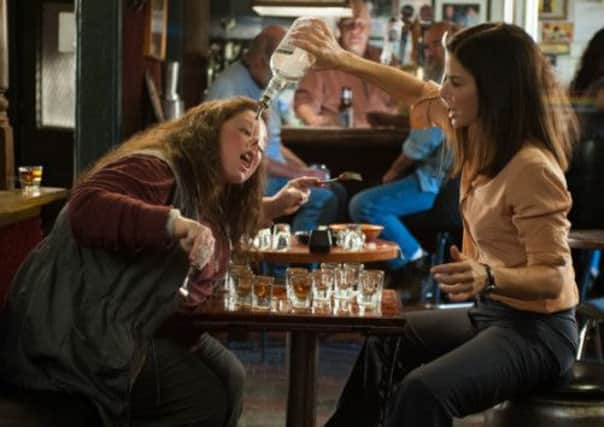Film reviews: Frances Ha| Days of Grace| The Heat


Frances Ha (15)
Directed by: Noah Baumbach
Starring: Greta Gerwig, Mickey Sumner, Adam Driver
* * * *
Having been joined at the hip since college, the split is more hurtful than her amusingly casual break-up with her actual boyfriend, but her efforts to put a brave face on it while attempting to be proactive about her life lead to a series of increasingly disappointing encounters that test her fundamental optimism to the core.
Baumbach uses Frances’s various abodes to demarcate her baffled progress through New York’s boho hinterland and watching her trying to figure out who she is a rare treat, one encapsulated by a loving homage to Leos Carax’s 1986 film Mauvais Sang that sees Frances running through the streets to the strains of David Bowie’s Modern Love. The sheer joy on Gerwig’s face as she leaps and pirouettes across roads and between pedestrians is infectious.
Days of Grace (15)
Directed by: Everardo Valerio Gout
Starring: Paulina Gaitan, Dolores Heredia, Carlos Bardem
* * * *
Advertisement
Hide AdThere’s something thrillingly unhinged about Days of Grace, a full-tilt Mexican crime epic about a trio of kidnappings that takes place against the backdrop of three successive World Cups. Very much of a piece with Brazilian exploitation flicks such as the Elite Squad movies, co-writer/director Gout’s debut feature serves up a barrage of bullets and bloodshed in the barrios of Mexico City, upping the ante with crazy surveillance-style camera work that puts us viscerally in the moment with its characters to give us a trench-eye view of the random urban warfare being unleashed on a daily basis.
The film’s main innovation is its purposefully confusing structure, which uses references to the unfurling 2002, 2006 and 2010 World Cup finals to signify the differing timelines of three interconnected stories, all linked by the increasingly frenzied actions of a whatever-it-takes-to-get-the-job-done cop (Tenoch Huerta) as he attempts to dispense justice in a world overrun with criminality and corruption. This makes Days of Grace tricky as hell to follow, but Gout cleverly uses the unpredictability of the sporting action as a guideline for his own tripartite narrative, ensuring that the story remains highly volatile at all times.
Blackfish (15)
Directed by: Gabriela Cowperthwaite
* * * *
Jacques Audiard’s magnificent 2012 film Rust and Bone was built around a whale trainer losing her legs during an orca attack and watching Blackfish – a horribly compelling investigation into the practices of SeaWorld Orlando in relation to its hugely profitable orca shows – makes it clear that such a plot twist isn’t as uncommon as one might think.
Indeed, Cowperthwaite’s documentary does a good job of highlighting just how psychologically damaging and barbaric it actually is to keep whales in captivity for the purpose of entertainment. Revealing that there have been no recorded attacks on humans in the wild, the film traces the history of Tilikum, a marine park whale that has been implicated in the deaths of three people in Canada and the US to expose how his conditions may have made this highly intelligent creature violent towards humans.
Ex-trainers talk with horror at their own naivety regarding the mammals they dreamed of working with and, having been denied an interview with SeaWorld representatives, director Cowperthwaite juxtaposes to devastating effect official PR spin with news reports and eye-witness accounts of marine park tragedies.
The Heat (15)
Directed by: Paul Feig
Starring: Sandra Bullock, Melissa McCarthy, Demian Bichir, Marlon Wayans
* * *
Advertisement
Hide AdIt takes a while for The Heat to warm up, but after about 30 minutes of straining-for-effect comedy, this buddy cop vehicle for Sandra Bullock and Melissa McCarthy proves a much funnier proposition than the thinness of its premise suggests. They play mismatched partners, forced to work together when Bullock’s prissy, by-the-book FBI agent is relocated to Boston to bring down a drug kingpin whose stranglehold on the city is choking the neighbourhoods McCarthy’s slovenly street cop is still proud to call home.
It’s the sort set-up that’s been seen hundreds of times before, but the simple gender reversal gives it a surprising freshness that makes its familiarity a little more entertaining, not least because it delivers the sort of outlandish violence not seen since the heady days of the Lethal Weapon franchise. This is a movie about finding a friendship rather than a man and, as such, the male characters are amusingly relegated to the action sidelines.
Like Someone in Love (12A)
Directed by: Abbas Kiarostami
Advertisement
Hide AdStarring: Rin Takanashi, Ryo Kase, Tadashi Okuni, Reiko Mori
* * *
Iranian director Abbas Kiarostami specialises in playing with form. His latest infuriating – but also fascinating – effort looks at intimacy and whether it’s truly achieveable in life, given the roles people play and the deceptions they commit on a daily basis.
Yet it also once again draws attention to its status as a film, one in which Kiarostami refuses to play the traditional role of the director by obfuscating meaning and avoiding anything that could be satisfyingly referred to as narrative closure.
Which would be all well and good if he didn’t conform to the clichés of the arthouse auteur in other ways by exhibiting that fascination many male film-makers seem to have with the ins-and-outs of high-end prostitution.
This provides a rather obvious scenario in which to explore the nature of love and deceit, although the Tokyo setting in which Kiarostami chooses to set the film’s rendezvous between an elderly academic and a student moonlighting as a call girl does allow him to represent the world in an exquisitely strange and unusual way.